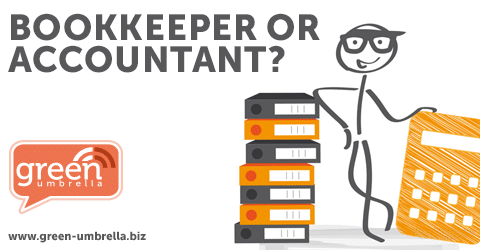Bookkeeper, Accountant – Either or both?

Bookkeeper, Accountant – Either or both?

When starting up in business, this is possibly one of the most confusing questions you will ask yourself. Nowadays more and more bookkeepers are becoming more qualified beyond the realms of simply bookkeeping, but it is important that you make the right choice for your business.
What do they do?
Bookkeepers usually only work up to Trial Balance level i.e. they will ensure all your data is correctly entered up to the pre-tax stage before handing it over to your accountant to analyse, check and prepare the relevant tax calculations, Corporation Tax, if you are a Limited Company, and your Self-Assessment if you are a Sole Trader. If you are VAT registered, then it is your bookkeeper who will check and prepare your VAT Returns before they are submitted to HMRC. Your bookkeeper works very closely with you on a more frequent basis whether it is daily, weekly, monthly or quarterly, whereas your accountant will probably only be in touch with you once a year or more frequently if you request his/her help in making any key business decisions.
Due to working with you very closely and more often, your bookkeeper will know what is happening in your business. There has to be a lot of trust between you as they will know exactly what your financial position is and may be privy to some sensitive information that you do not want other employees or staff to be aware of. Most of all, you have to be honest and totally transparent with them.
It is equally important that you have an accountant that you feel you can contact throughout the year to help with key business decisions rather than once a year contact, as it may well be too late then as the transaction will already have been completed. Accountants are looking at more of a snapshot of your business at a given date which will have passed, rather than the current data that your bookkeeper is working with.
Should you do your own bookkeeping?
With the ever changing and improving bookkeeping software available to the new business owner it can be very tempting to start off doing your own bookkeeping, but it’s not a simple matter of data entry. If you do not understand the impact an entry has on the accounting reports available to you, you may never have a true picture of how your business is actually performing. Indeed, you may well land up with a hefty accountant bill at the year end if they have to go through making adjustments and corrections rather than having paid a bookkeeper to keep everything up to date and correctly entered throughout the year, resulting in a false saving.
Nowadays there are many bookkeepers who have gone on and trained as accountants and can complete both functions. Accountancy is a wide spectrum, and it is impossible for anyone accountant to be an expert in every aspect, so it is important that they only deal with areas they are experienced and knowledgeable in and are able to refer you to someone else at times when you require advice on areas outside their own knowledge base.
Conclusion
It really is advisable to have a bookkeeper and an accountant, which may well be the same individual or company, who will enable you to spend your valuable time doing what you know best and run your own business with the confidence and assurance that the financial side is being looked after, and the information you are being provided with is up to date and accurate.
[social-bio]
Experience of working with small and medium sized companies as well as sole traders covering a wide range of sectors
Share this!

